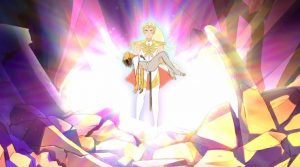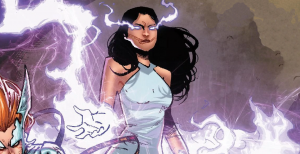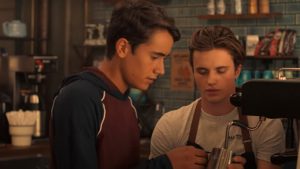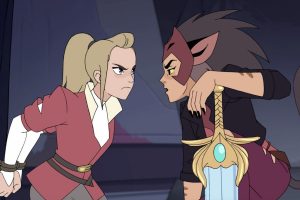There’s a small but memorable scene in Wonder Woman 1984 in which the film’s major antagonist, Maxwell Lord (the irresistibly charming Pedro Pascal), having just worked his dark magic on the President of the United States and sparked an all-out nuclear war with the Soviet Union, tries to escape from an altercation at the White House only to find himself awkwardly handcuffed to Steve Trevor (Chris Pine), Wonder Woman’s quick-thinking sidekick and lover. I bring this up because it’s representative of the film overall, which handcuffs itself to Pine’s Trevor and stubbornly sticks to him even as his very presence in the story demands that the entire plot revolve around him and not the lead character. The only way this metaphor could have been made even stronger would be if Wonder Woman herself were handcuffed to Trevor in this scene to reflect the film’s inability to give independence or agency to its female characters.
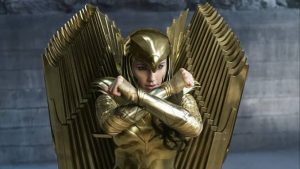
Make no mistake, I loved Pine in the first film – and I adored the mature, elegant romance between him and Diana Prince (Gal Gadot): which was written in such a way that both characters could be strong and vulnerable with each other, and both had equal footing – with Diana clearly and effortlessly remaining the lead. Trevor’s death in Wonder Woman was a heartbreaking and powerful moment that allowed us all to see the good in humanity. And yet he’s back in Wonder Woman 1984, nearly a century after his death in World War I, doing pretty well for a guy whom we last saw get blown to bits in mid-air. Prior to the film’s release, I was as excited as anyone to see him return: in hindsight, I’m beginning to realize how foolish it was to ever attempt something that could so easily go so wrong…and did.
It’s blasphemous to even suggest, I know. The first film relied so heavily on that spark of chemistry between the two actors and their characters. But Wonder Woman 1984 had the means to substitute that timeless pairing for another one that could have been just as well-written and well-received, if director Patty Jenkins and her team of screenwriters hadn’t decided to resurrect Steve Trevor for one last lackluster hurrah: because let me tell you, everything that’s bad about this film’s flawed script, from the convoluted globe-trotting adventure to the random interlude with a Mayan shaman, feels to me like the inevitable side-effect of having to devise an excuse for how Steve was even able to come back at all.
And with the return of Steve Trevor, Diana herself gets sidelined in a story that seems almost uninterested in her as an individual. She’s got nowhere left to go and nothing new to learn, essentially. A vague theme about the importance of being true to yourself is woven throughout the film, but it’s not exactly an urgent message that Diana personally has to embrace, unlike the first film’s timely reminder to believe in the goodness of people. She was being true to herself anyway, before Steve randomly came back into her life and took over her entire storyline (oh, the parallels to Avengers: Endgame). I mean, it’s really a shame there was no way to weave this message more cleverly into the plot and romantic subplot by…oh I don’t know, making this a queer love story?
Just as DC preceded Marvel in the department of successful female-led superhero movies, many of us had hoped they’d be the first to give us a proudly and openly LGBTQ+ superheroine onscreen in the form of Diana Prince (Harley Quinn was vaguely bisexual in Birds Of Prey, and a supervillain anyway). We’ve known for some time that wouldn’t be the case, with Patty Jenkins confirming that wasn’t the story she wanted to tell. But what we get instead is a film that tiptoes around even the possibility of a same-sex romance as clumsily as Barbara Ann Minerva (Kristen Wiig) strides around the Smithsonian in high heels. Now, to be fair, most of the romantic tension between Diana and Barbara is more a result of the palpable chemistry between the two actresses (the quiet, ethereal Gadot and sparky, exuberant Wiig complimenting each other very nicely), rather than necessarily indicative of anything intentionally written into the script, but at the same time…come on. Both Diana and Barbara are canonically bisexual in DC Comics, and you’re telling me Patty Jenkins didn’t know what she was doing by casting a romantic filter over their awkwardly flirtatious lunch overlooking the Washington Monument, or having Barbara tumble into Diana’s arms in a subversion of a dated Hollywood romantic trope? It’s queerbaiting that only serves to underscore the fact that the rest of the movie is, in the words of one of my favorite reviewers, Valerie Complex; “aggressively heteronormative”.

To the surprise of absolutely no one, the scenes that center women are the highlights of the film: from those early interactions between Diana and Barbara, to the epic prologue action sequence on the Amazonian isle of Themyscira, to a cheeky and delightful mid-credits scene. But none of these isolated scenes make up for the fact that the character arcs of both female leads in Wonder Woman 1984 (one of those female leads being a literal icon of feminism) revolve almost entirely around men. For Diana, that’s Chris Pine’s Steve, who returns with the help of an incredibly convenient plot device and plays fish-out-of-water for a while…a really long while, during an excruciating montage that exists solely to trot out every semi-nostalgic 80’s cultural trope you can imagine. Pine is still perfectly likable and has some laugh-out-loud line deliveries, but never truly recaptures what made his character so special – and thus feels like a burden the film must carry.
For Barbara Ann Minerva, it’s Pedro Pascal’s Maxwell Lord – who is quite an interesting character, despite being surprisingly little like the young Donald Trump we all assumed he would be based on the promotional material. An oil tycoon with his eye on a legendary ancient wishing stone forged by the Gods, Lord seduces the world with his voice and power to make the impossible possible. He’s got Trumpian elements to his character, of course (among the more obvious examples: he yells “You’re hired!” at one point), but his motivations are relatable, and his charm genuine. Pascal also just oozes the kind of unshakably consistent charisma that can turn a silent, faceless gunslinger into a beloved icon, or make a dumpster fire of a movie like We Can Be Heroes shockingly entertaining.
Minerva herself does get to transform into the anthropomorphic Cheetah we know from the comics, and the CGI isn’t entirely awful as she flails about in her dimly-lit third-act duel with Diana (or perhaps Diana’s Golden Eagle armor is so distractingly awful I didn’t notice), but she deserved to be the major antagonist of this film, and not merely Maxwell’s loyal henchwoman. I’m also afraid that Wiig’s excellent dramatic performance and thrilling action sequences will be overshadowed in the larger fandom discourse.
Apart from Wiig’s notable fights (particularly her brutal takedown of a drunk man who continually harasses her on her jogging route), the action in Wonder Woman 1984 is fairly slight, with the only other standout being the prologue on Themyscira, where the Amazons compete for honor and glory in a series of challenges that test their physical abilities. If Jenkins is going to commit to having Diana only use her Lasso of Truth as a weapon (an idea I actually really like, as it reflects the character’s refusal to kill), she just has to find better ways to incorporate it into action scenes, because it can too easily come off as overly ridiculous.

Jenkins did make other “campy” elements from the character’s mythology work for Wonder Woman 1984, though, including Cheetah (doesn’t matter if she’s dressing up as a cat, or literally morphing into one: it’s still a hilariously campy concept), and the Invisible Jet – which comes about through a bizarre but acceptable deus ex machina. Unlike Shazam, this film isn’t trying to be goofy or funny: it still takes itself very seriously, and thus comes across as uniquely earnest for a superhero movie. In some ways, I’d say that’s one of several ways in which the movie evokes real 80’s adventure movies: both the good and the bad. The heightened sense of adventure, the not-so-great CGI you’re willing to excuse because everything happening onscreen is just so much fun, and the outdated perceptions of women and foreign nations that make us cringe deeply in our souls (we just need to collectively stop letting white American directors write North African and Middle Eastern nations into their scripts, because they’ve proven they’re not up to the task of handling those nations and their individual cultures at all well).
There’s still plenty of hope for the Wonder Woman franchise in the near future. We’re not dealing with another Crimes Of Grindelwald here (although the box-office reception would seem to disagree). But the divisive audience reactions and legitimate criticisms of Wonder Woman 1984 should hopefully alert Warner Brothers to the need to put this series back on track with better screenwriters and a stronger, more cohesive focus on women as individuals with their own storylines….even (and especially) if that means no more Steve Trevor.
Movie Rating: 6.5/10
